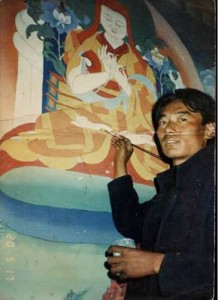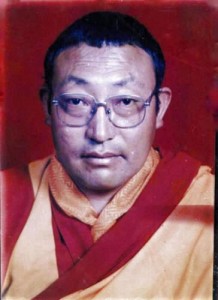 Tibetan art teacher and musician, Kunkhyen, sentenced to nine years for espionage linked to Runggye Adak’s call for the Dalai Lama to return to Tibet.  Lupoe, a senior monk at Lithang Monastery and nephew of Runngye Adak, was detained on August 21 after calling for the release of Runngye Adak. Lupoe was sentenced to 10 years imprisonment for attempting to provide pictures and information to ‘overseas organizations’ which were judged to ‘endanger national security’. |
Runggye Adak, the Tibetan nomad who took to the stage during the Lithang Horse Festival on August 1 and called for the Dalai Lama’s return to Tibet, has been jailed for eight years on charges of ‘inciting to split the country’, according to a statement released by Xinhua today (November 20). Runggye Adak’s nephew, Adak Lupoe, a senior monk from Lithang monastery, received a longer sentence of ten years, and Tibetan art teacher and musician Kunkhyen was jailed for nine years, both for attempting to provide pictures and information to ‘overseas organizations’ which were judged to ‘endanger national security’. A fourth Tibetan, Jarib Lothog, was sentenced to three years in prison linked to the same case.
It is significant that the two Tibetans allegedly reporting on the event were sentenced to longer terms than the perpetrator, and may be intended to convey an intimidatory signal to Tibetans about passing on news about unrest or dissent to the outside world, particularly in the run-up to the summer Olympics in Beijing.
Since the incident on August 1, there has been a military crackdown in Lithang in eastern Tibet, and a climate of fear in which Tibetans are often too frightened to speak to friends and family on the telephone. Monks, government workers and other laypeople have also been required to engage in an intensified political campaign against their religious leader, the Dalai Lama, which is leading to continued resentment and despair. There have also been reports of Tibetans, including one senior lama, refusing to denounce the Dalai Lama, even while they know the risks of doing so.
According to a Tibetan source, during his trial in Dartsedo, Runggye Adak, a father of 11 children and a respected figure in his local nomadic community, told the court that he did not carry out his protest in favor of the Dalai Lama to be a hero. He said: “I wanted His Holiness to return, and wanted to raise Tibetan concerns and grievances, as there is no outlet for us to do so. That made me sad and made me act.” Runggye Adak’s government-appointed lawyer reportedly argued that asking for the return of the Dalai Lama to Tibet was purely a religious action, and not an act to bring down the government.
Mary Beth Markey, Vice President of the International Campaign for Tibet, said “An eight year prison sentence for expressing a wish that is commonly held among Tibetans, the return of the Dalai Lama to Tibet, reveals the crackdown against fundamental freedoms in Tibet today and does not square well with the image China wants to present to the world in the buildup to the Olympics. These hardline, confrontational strategies only risk creating further dissent and unrest, and do not support China’s wish for genuine stability in the region.”
Xinhua reported today that Adak Lupoe (Chinese transliteration: Lubo) and Kunkhyen (Jacmyang Goinqen) were sentenced at the Kardze (Chinese: Ganzi) Intermediate Court for spying for overseas organizations after they took pictures, made discs, and “provided them to overseas organizations” via Jarib Lothog (Lutog). “Some contents leak intelligence that endangers national security and interest,” the court said in its verdict today (Xinhua, November 20, 2007).
Xinhua stated that the actions of 52-year old Runggye Adak (Chinese transliteration: Rongji Azha), led to “public besieging of government offices…because local people were not clear about the truth”, which the court said was a severe disruption of public order. This refers to the gathering of more than a hundred Tibetans in the compound of the local police station in Lithang where Runggye Adak was detained after his protest action during an official ceremony at the horse festival. During the trial, Runggye Adak’s lawyer apparently argued that as Runggye Adak was in custody at the time, he could therefore have had no involvement in organising the crowds gathered in the compound of the police station.
The sentencing of the four Tibetans took place in an environment of tension and intensified repression, including a buildup of troops on the streets. The expressions of support among Tibetans for Runggye Adak’s statements at the horse festival led to the launch of an intense ‘patriotic education’ campaign throughout Kardze Tibetan Autonomous Prefecture, in present-day Sichuan (the Tibetan area of Kham). According to accounts in the official press, the entire month of September was given over to intensive “concentrated patriotic education activities” in which government workers had to express support for the government’s handling of the ‘August 1 incident’, as Runggye Adak’s protest is referred to. At the prefectural communicaions bureau, all staff, including retired staff, at the bureau were required to take two days a week to study Marxist theory on religion and ethnicity as well as the ‘August 1 incident’. (Ganzi Daily, September 5, 2007).
An element of the patriotic education was a requirement for staff to recite a scripted “public statement of political attitude” in front of their colleagues and bosses. In the case of Kardze Nationalities Teacher Training College in Dartsedo, staff were required to recite: “Take a firm and decisive stance against the Dalai’s ethnic splittism; resolutely uphold the unity of the nationalities and the reunification of the motherland; resolutely support the decisive handling of the ‘August 1’ incident by the provincial party committee and the prefectural party committee; firmly establish the correct viewpoint of the motherland, the nationalities, religion and culture; support dialectical materialism and atheism.” (Ganzi Daily, September 28, 2007.)
Runggye Adak’s nephew, Adak Lupoe, who was sentenced to ten years today, was detained on August 21. He is in his early forties and respected in the local area for his Buddhist scholarship and for his concern about the Tibetan education of young people. Kunkhyen, who was sentenced to nine years, is a popular local musician, artist and teacher at Lithang Middle School known for his skills on the Tibetan stringed instrument, the ‘dranyan’, and for painting murals in some of the local monasteries. Jarib Lothog is a Tibetan nomad in his early thirties from Lithang who was detained in a hotel room in Chengdu and has been sentenced to three years.
The court described the contents of the pictures and disks that led to the conviction of Adak Lupoe, Kunkhyen and Jarib Lothog as leaking ‘intelligence’. In Chinese law, the concept of ‘intelligence’ has been treated almost interchangeably with state secrets, especially in the context of disclosures to the outside world or the charge of endangering state security. Its definition relies on the examination of what should be public, and in this respect courts and legislators fail to provide a clear interpretation. The Chinese authorities take great efforts to prevent news on incidents of unrest from reaching the outside world as part of a broader political culture of secrecy and in order to maintain political control.

